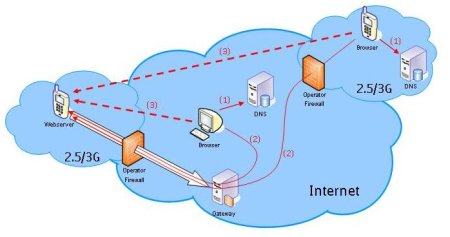Nokia turns cellphones into webservers
Jun 2, 2006 — by LinuxDevices Staff — from the LinuxDevices Archive — 3 viewsNokia has ported the Apache webserver to Symbian, in order to enable mobile phones to serve content on the World Wide Web. Many mobile phones today have more processing power than early Internet servers, suggesting that “there really is no reason anymore why webservers could not reside on mobile phones,” according to the company. The technique could also be used on Linux mobile phones.
Nokia says it's “Raccoon” project started out with the Unix version of Apache, and exploited Symbian's POSIX layer in making the port. In addition to the basic Apache httpd daemon, Nokia ported mod_python, in order to enable dynamic pages generated from both Python scripts and PSP (python server pages). Other built-in modules include mod_alias, mod_auth, mod_autoindex, mod_dav, mod_dav_fs, mod_dir, mod_log_config, mod_mime, mod_rewrite, and mod_setenvif.
Nokia says it installed its experimental port, initially, on a Nokia 6630, which it then accessed over a Bluetooth PAN (personal area network). This proved somewhat useful, in that it brought “the possibility of accessing functionality on the phone using a big screen and proper keyboard.” However, the project's goal was to enable access to the phone of the cellular network. This proved challenging due to firewalls explicitly deployed by operators to prevent such access.
Ultimately, Nokia says it was able to develop a gateway application, released under the open source Apache2 license, said to be capable of providing a webserver on a mobile phone with a URL accessible from any Internet browser. “In a sense, the mobile phone has now finally become a full member of the Internet,” Nokia says.

Raccoon project architecture
(Click to enlarge)
Users with Internet-connected PCs can install the gateway application themselves. A single gateway can support somewhere between 100 and 1,000 concurrent users, and many more actual accounts — making it suitable for university trials, Nokia says.
Alternatively, Nokia offers a Gateway service, which it says it is committed to providing “for the foreseeable future.”
The implications of mobile phone-based websites
Nokia notes that websites hosted on mobile phones enable phone owners to inter-actively participate in content generation. For example, Nokia has written an application that prompts the phone owner to take a picture, which is then relayed to the requester as a JPEG.
Another touted advantage is that the amount of personal information stored on mobile phones makes it easy to “semi-automatically generate a personal home page.”
So far, Nokia's “concept demonstration applications” include:
- Interactive, contextual, and location-dependent content
- Use the phone as a webcam
- Find other mobile web sites in the proximity
- Find out the location of a mobile website (cellid)
- Enabling new communication means without operator involvement
- Send instant message
- Leave instant message in the inbox
- Leave a note on a mobile weblog
- Access core data
- Access favorites, contacts, calendar, logs, and messages
- Download images
- Mount a read-write view of the root webserver directory and edit pages directly using WebDAV
Nokia's Raccoon project believes mobile phone webservers could have large implications for the Internet. It says, “If every mobile phone or even every smartphone initially is equipped with a webserver, then very quickly most websites will reside on mobile phones.”
An Internet comprised largely of mobile phone-based servers could challenge search engines to keep pace, however, because of the “dynamism” of an Internet where site content can change from minute to minute.
Availability
The Raccoon Project's Symbian port of apache and gateway software can be freely downloaded under an Apache2 license from the project's Sourceforge website. The apache port was developed using a Nokia 6630, but should work on any “S60 2nd Edition Feature Pack 2” phone. The gateway application comes with Linux install scripts, but may also work on Windows. It requires a static IP, but may also work with dynamic DNS services.
Users wishing to use Nokia's gateway services, instead of running their own gateway, may request an account via email; additional details can be found here.
This article was originally published on LinuxDevices.com and has been donated to the open source community by QuinStreet Inc. Please visit LinuxToday.com for up-to-date news and articles about Linux and open source.